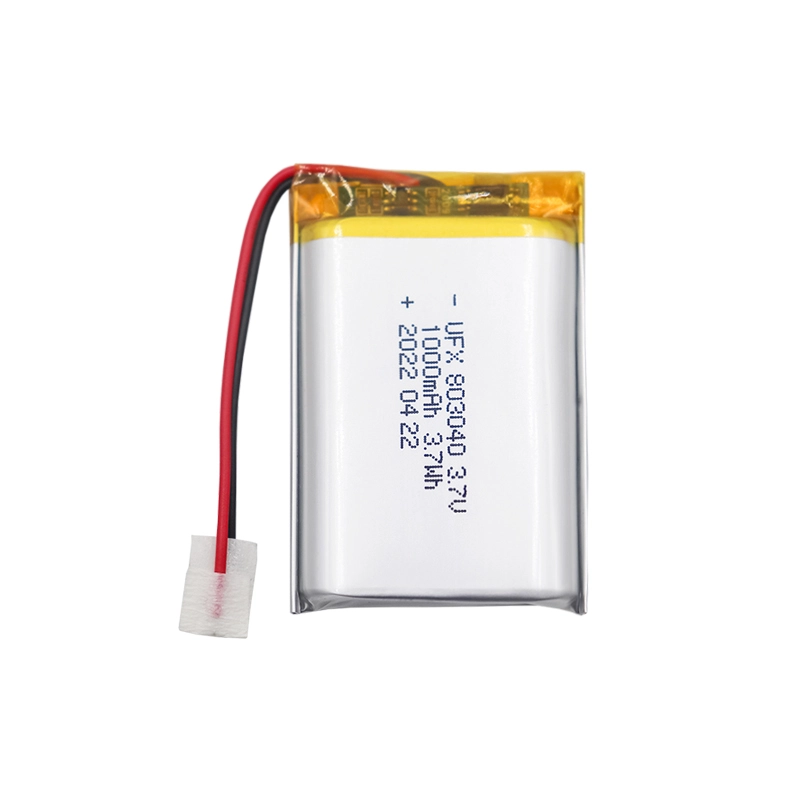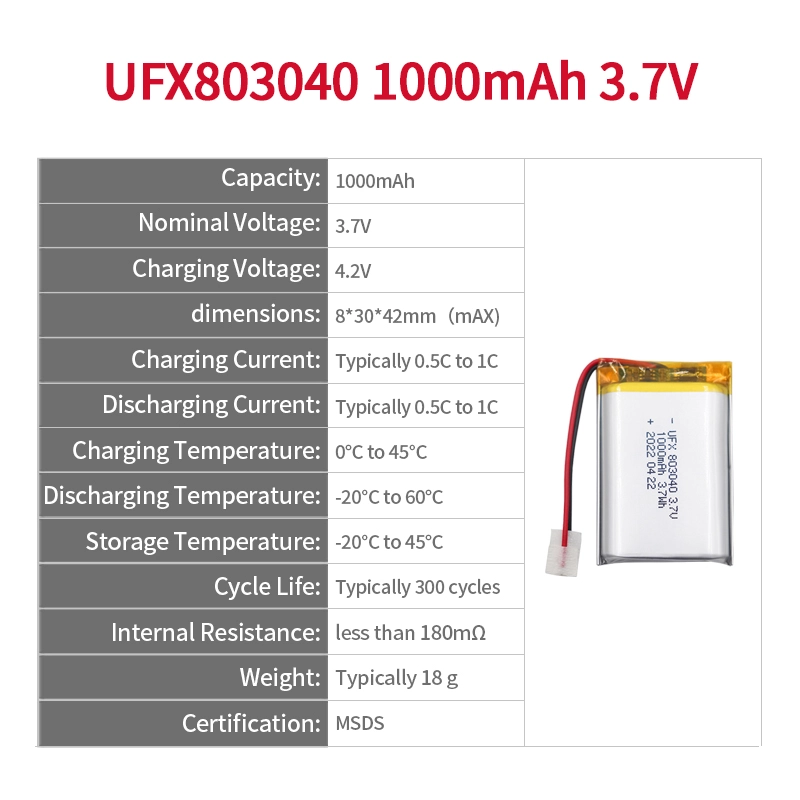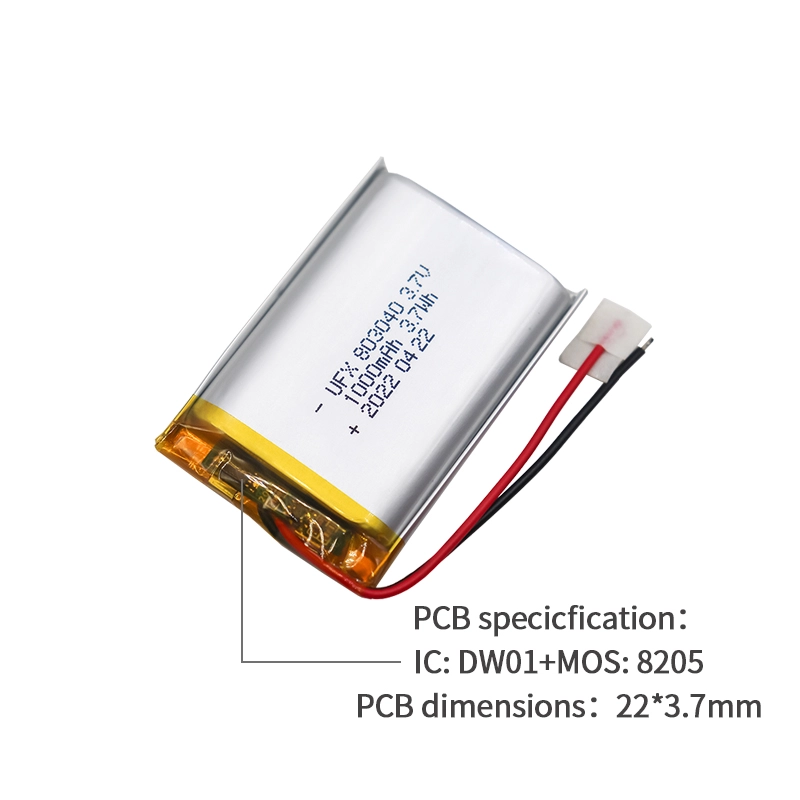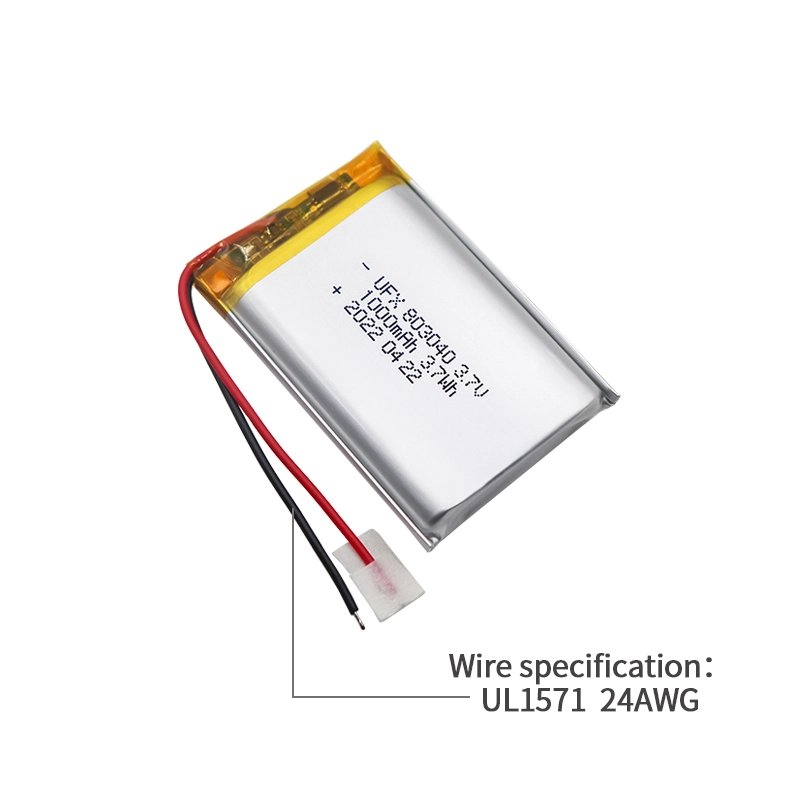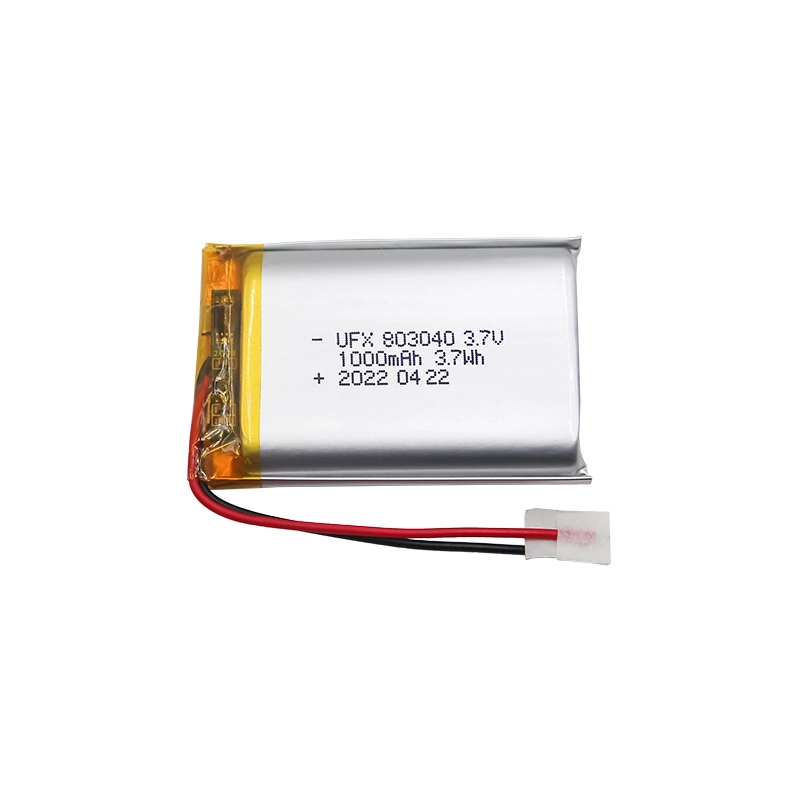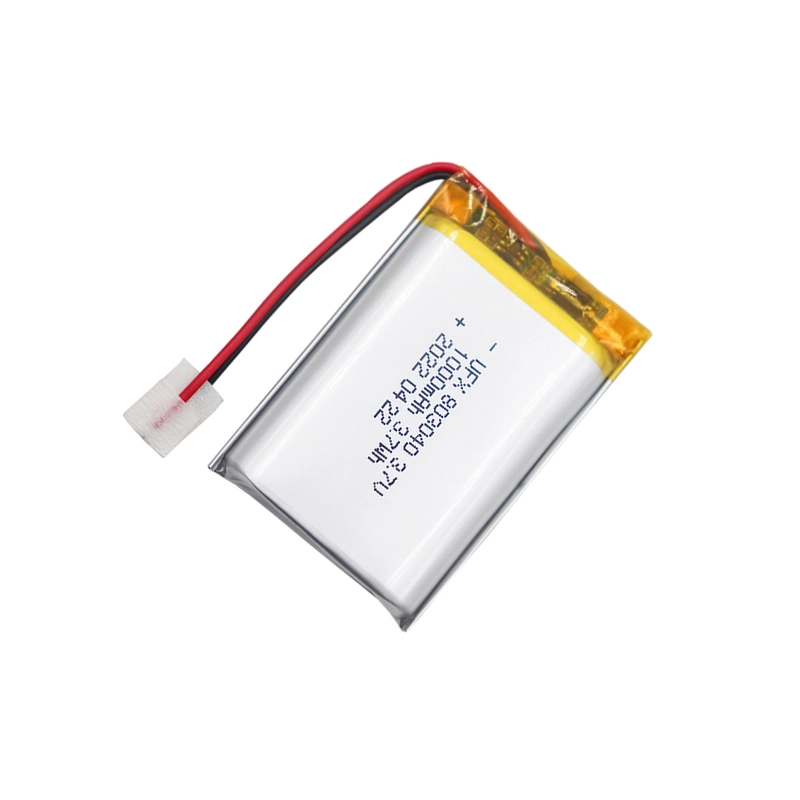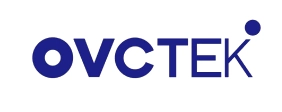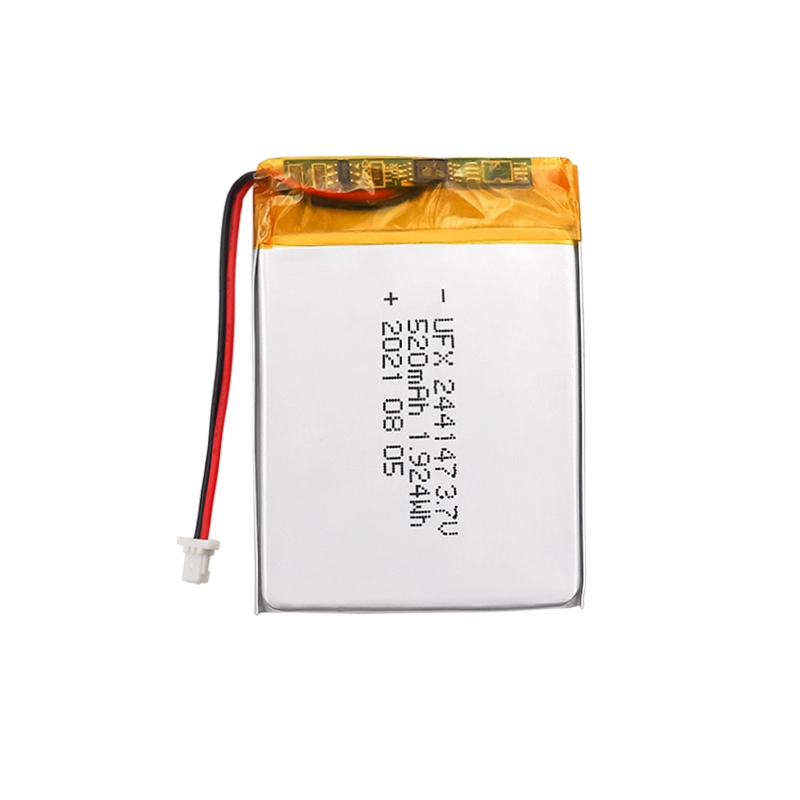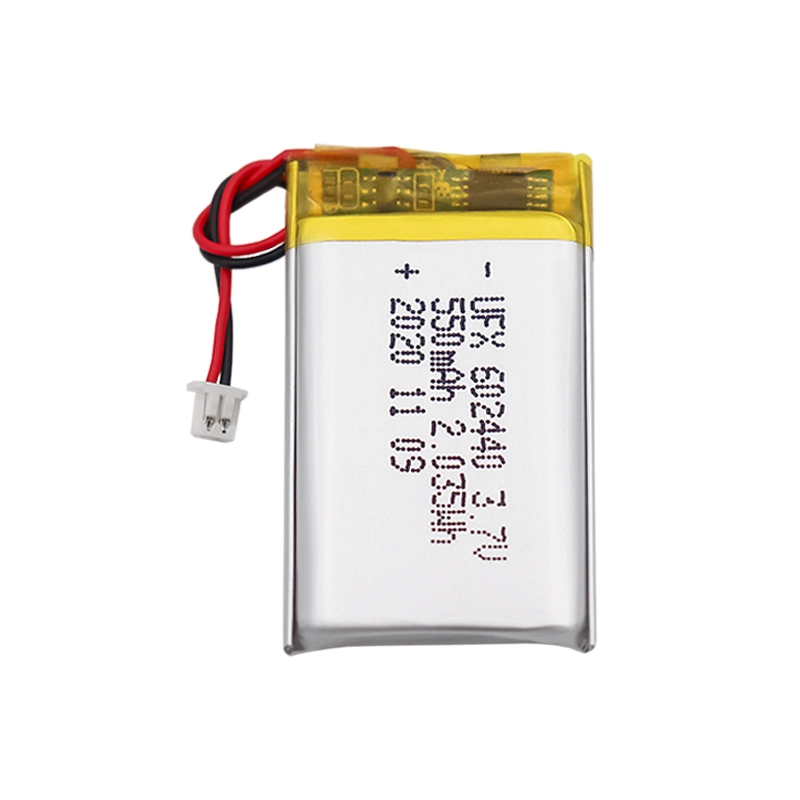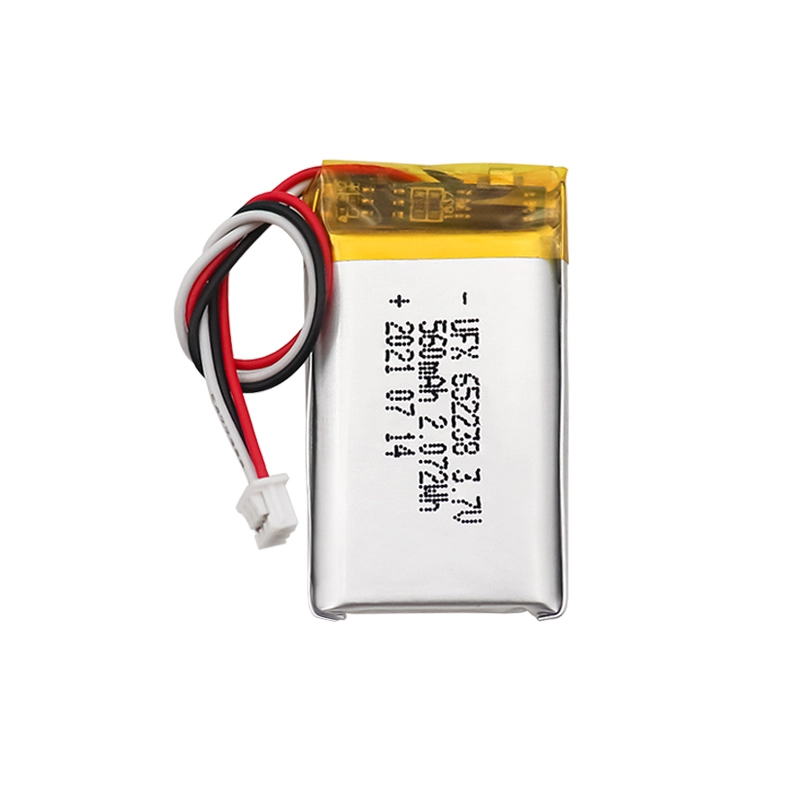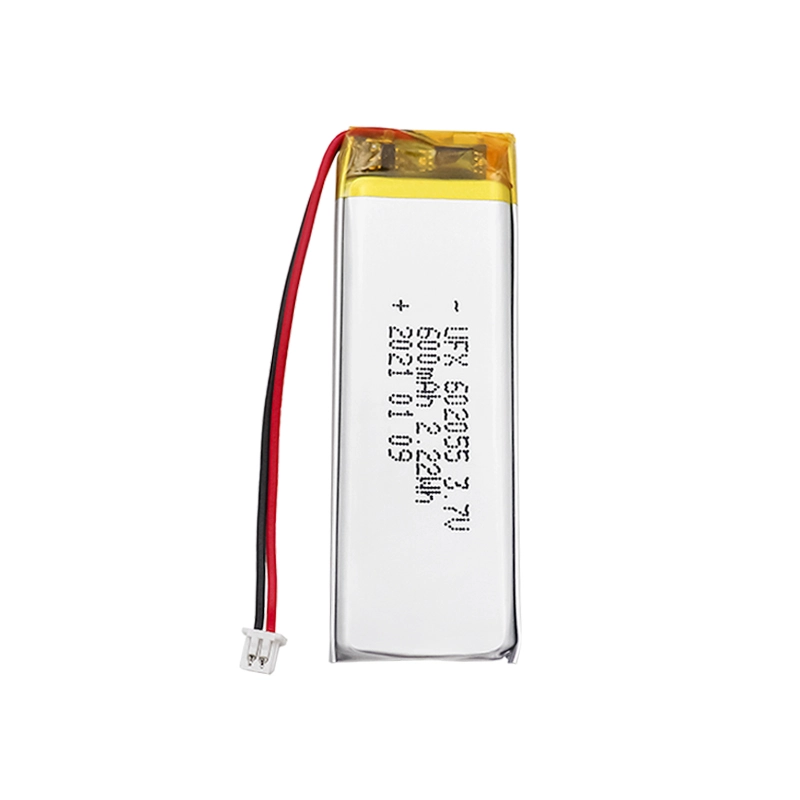-
Product Details
-
Specs
-
Content
-
FAQs

Balanced Power: 3.7V 1000mAh Lithium Ion Battery 803040
Looking for a compact battery that delivers both runtime and output stability? Ufine’s 3.7V 1000mAh Li-ion Polymer Battery 803040 offers an excellent balance of size and energy storage. With a capacity rating of 1000mAh and energy output of 3.7Wh, this cell is ideal for smart sensors, handheld instruments, connected IoT devices, and mini consumer electronics that require dependable 3.7V supply without increasing overall device thickness.
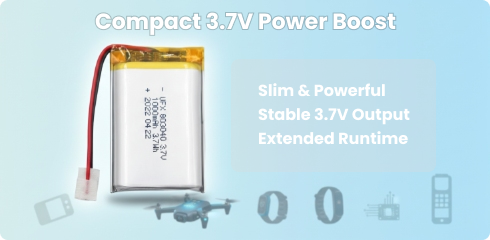
Performance Curves of 3.7V 1000mAh Li-ion Battery
Review the discharge stability, cycle endurance, temperature adaptability, and standby retention performance of the 803040 Li Po cell.
- Discharge Curve
- Cycle Endurance
- Temp Range
- Standby Retention
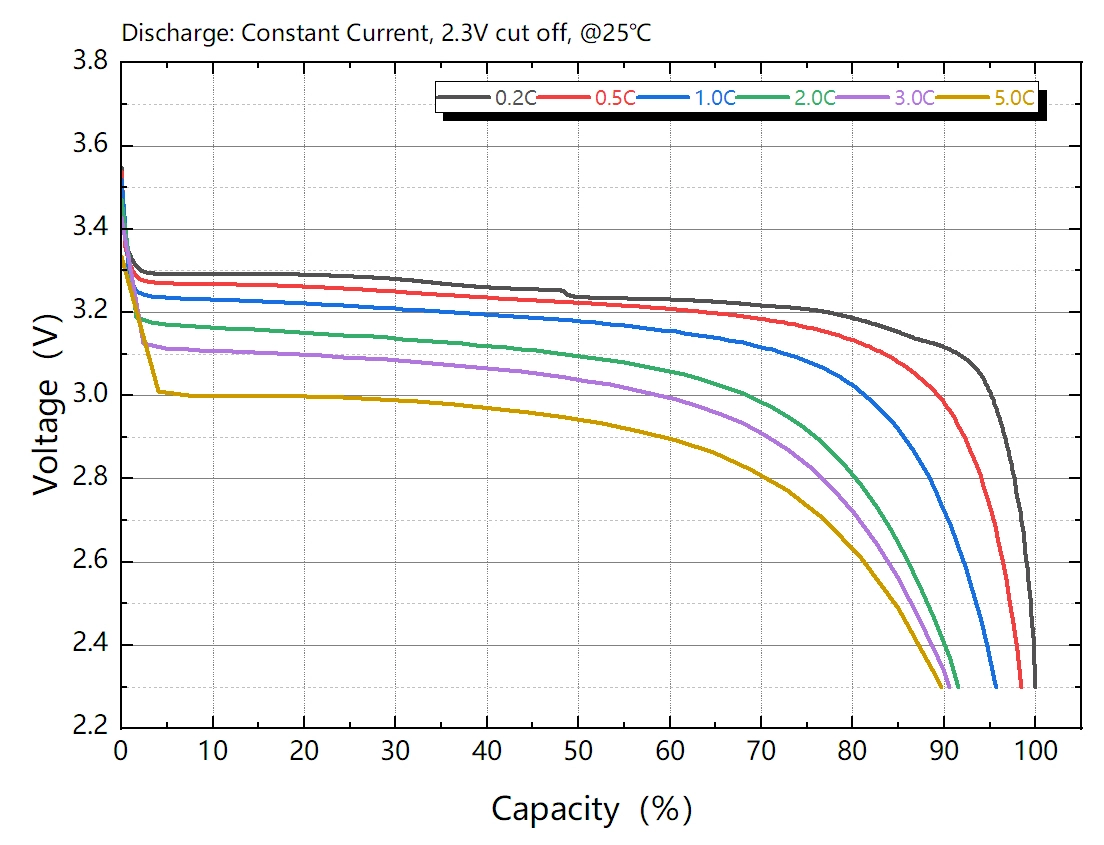
Consistent Mid-Power Discharge
The 803040 Li-ion polymer battery maintains a smooth voltage curve under typical 0.2C–0.5C loads, making it suitable for continuous operation in portable devices.
- Stable discharge from 4.2V down to cutoff
- Supports 0.5C continuous load
- Short bursts up to 1C peak when required
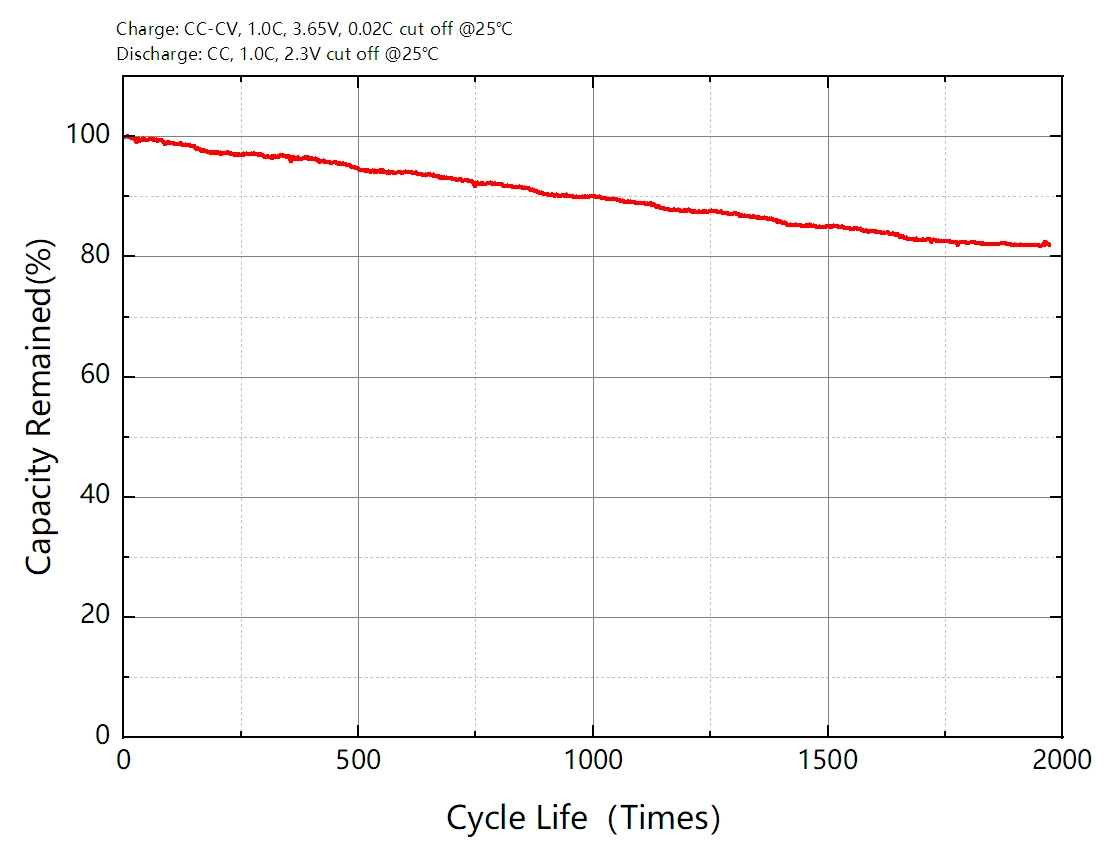
Durable Cycle Performance
Built with optimized electrode coatings, the 803040 cell maintains strong capacity retention across daily charging. A reliable choice for devices needing long-term deployment.
- 300–500 cycles at 0.5C
- Uniform capacity attenuation over lifetime
- Designed for frequent charge patterns in IoT and handheld tools
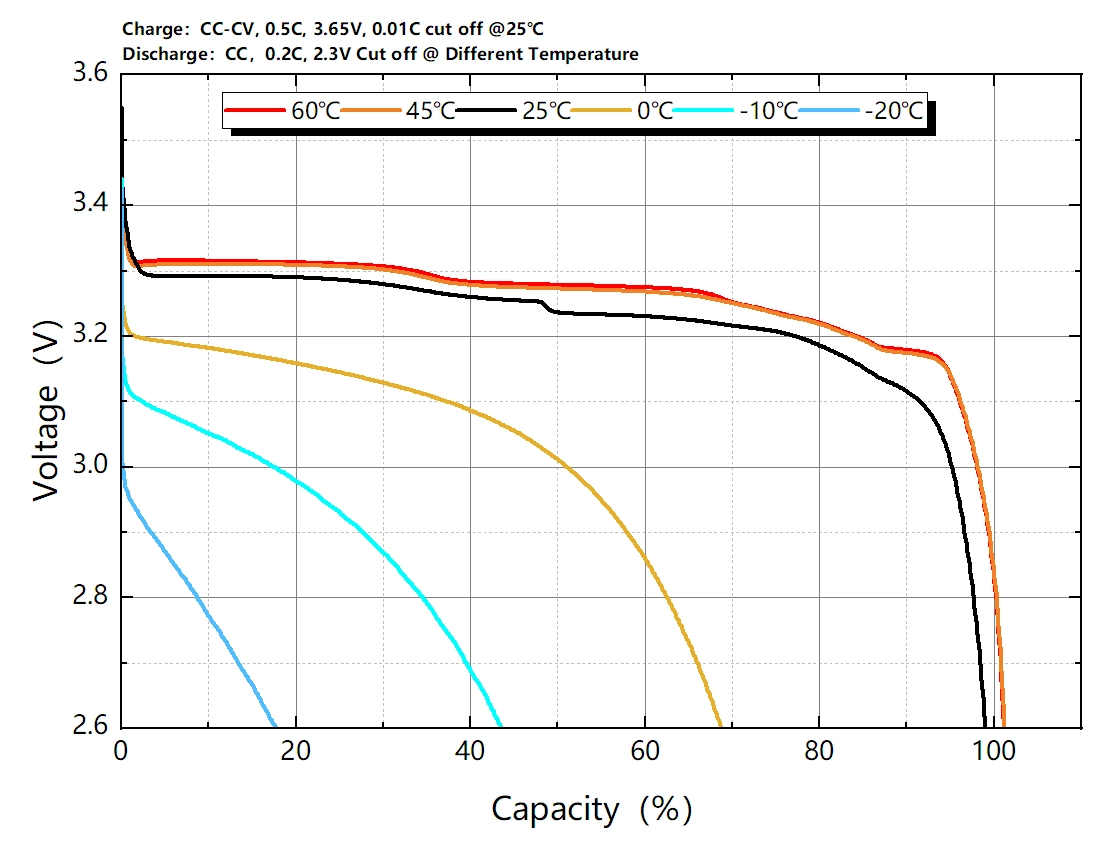
Reliable Environmental Adaptability
The 803040 Li Po battery maintains stable internal resistance across a wide temperature range, supporting outdoor and variable-climate applications.
- Operating range: -10°C to 60°C
- Optional low-temperature formulation down to -30°C
- High-temp customization for up to 70°C use cases
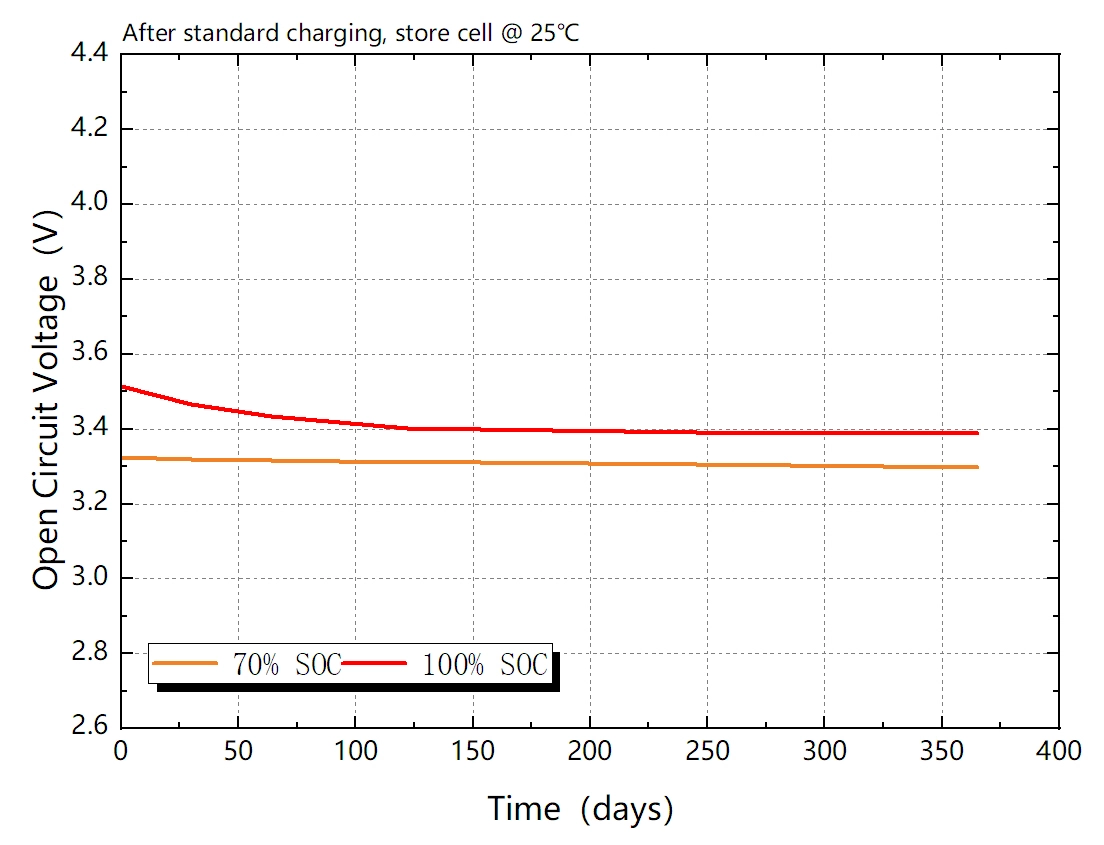
Optimized Standby Retention
With a tightly controlled electrolyte formulation, the 803040 cell minimizes capacity loss during non-active periods, enabling longer shelf and standby performance.
- Low monthly self-discharge under 25°C
- Ideal for intermittently used IoT devices
- Maintains stable voltage after extended storage
Engineered for Long Runtime Stability
The 803040 Li-ion polymer battery is optimized for devices requiring predictable and extended energy output.
Why the 803040 Stands Out
Instead of focusing on high-rate performance, this model is tuned for maximum usable capacity and voltage consistency. It provides a smooth discharge curve, making it ideal for instruments and smart devices that demand stable 3.7V over long operation hours.
- Improved active material utilization
- Reduced internal resistance drift over time
- Stable voltage plateau suitable for sensors and handheld tools
- Customizable configurations for different current profiles
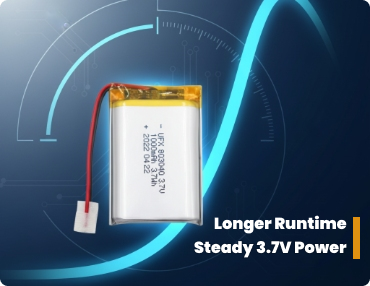
Quality You Can Trust
Every 803040 battery is manufactured with strict process control to ensure uniformity and stable output.
View Production Details 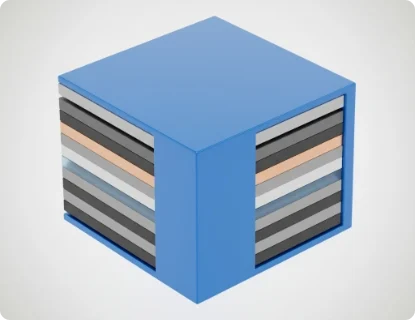
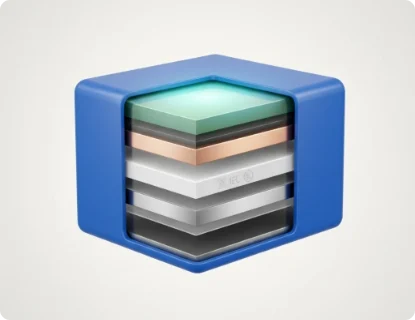
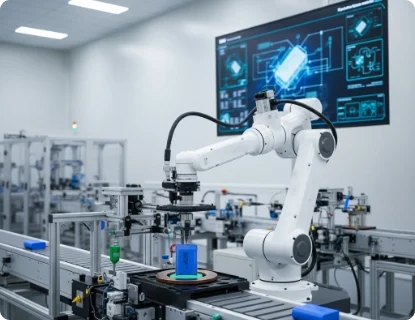
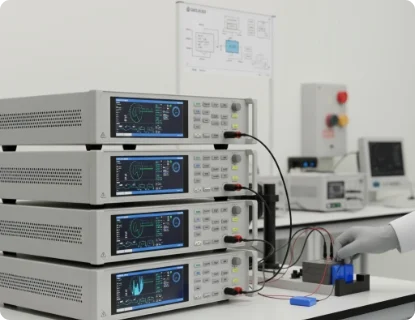
Other Battery VS Ufine Battery
See how the Ufine 803040 battery performs compared to generic alternatives.
Our Battery
- Stable voltage curve for mid-power applications
- Low swelling rate and high dimensional reliability
- Custom samples as fast as 3 days
- Improved cycle retention with consistent IR
- Strong after-sales support
- Precision 803040 size for compact enclosures
- Multiple connector options
- Operating Temp: -10°C ~ 60°C (Customizable)
Other Battery
- Unstable voltage under medium loads
- Inconsistent size tolerance
- Higher internal resistance variation
- Lack of customization options
What We Custom and How
Ufine provides tailored 3.7V Li-ion polymer solutions for diverse applications.
- Custom Sizes & Shapes from 0.5mm Thickness
- Capacity Selection from 100mAh to 100Ah
- Temperature Options: -30°C ~ 70°C
- Connector Options: JST / Molex / Hirose / TE / etc.
- PCM/Protection Circuit Integration
-
01Determine dimensions based on device enclosure
-
02Define current and runtime requirements
-
03Select appropriate temperature and cycle specs
-
04Match connector and wire type for installation
-
05Integrate PCM or customization features as needed
Battery Specification
-
1. Mechanical Characteristics
Cell 803040 PCM Yes NTC No Weight appr. 18g Configuration 1S1P -
2. Electrical Specification
Capacity 1000mAh Nominal Voltage 3.7V Energy 3.7Wh Internal Resistance less than 180mΩ Max. Charge Voltage 4.2V Discharge Cut Off 2.75V Max. Charge Current 1000mA
Max. Discharge Current 1000mA Standard Charge Current 200mA Standard Discharge Current 200mA Charging Temperature 0℃ to 45℃ Discharging Temperature -20℃ to 60℃ Storage Temp.Range 1 year at -20℃ to +30℃ 3 mos. at -20℃ to +45℃ 1 mo. at -20℃ to +60℃ Cycle life 100 cycles ≥92% 300 cycles ≥88% 500 cycles ≥80% -
3. Cell protection
Overcharge Detection 4.28V ±50mV (80 to 200msec delay, release 4.08V ±50mV) Overdischarge Detection 2.4V ±100mV (40 to 120msec. delay, release 3.0V ±100mV) Overcurrent Detection 2.5A to 4.5A (5 to 10msec. delay) Short protection Yes
The 3.7V 1000mAh lithium-ion battery (803040) is a versatile power solution widely used in compact IoT sensors, portable smart devices, handheld terminals, and lightweight consumer electronics. As a polymer-structured cell, this 803040 lithium polymer LiPo combines stable output with efficient space utilization—making it an excellent choice for device manufacturers seeking both performance and size consistency.
In this guide, you’ll learn how the 3.7V 803040 LiPo battery performs in real-world use, where it fits in modern applications, and what to consider when integrating this 1000mAh 3.7V battery Li-ion into your product. Whether you're designing a new device or replacing an existing battery format, these insights will help you make an informed decision.
Part 1. Applications of the 3.7V 1000mAh polymer lithium-ion battery
The 3.7V 1000mAh polymer lithium-ion battery is valued for its balanced footprint and capacity. It fits naturally into medium-sized enclosures while offering enough runtime for continuous tasks. Typical applications include:
-
Smart handheld devices – Barcode scanners, POS terminals, and portable measurement tools benefit from stable voltage and long operating time.
-
IoT and smart home devices – The compact size makes the li pol 803040 battery ideal for controllers, hubs, and low-power wireless modules.
-
GPS trackers – Provides dependable 3.7V output for tracking devices that require consistent background operation.
-
Wearable and healthcare gadgets – Lightweight construction ensures comfort without compromising energy density.
If you’re unsure whether the 3.7V 803040 LiPo battery fits your device requirements, you can contact Ufine Battery for technical guidance and custom sizing options.
Part 2. Performance insights for the 803040 lithium polymer LiPo
Beyond basic specifications, what makes the 803040 lithium polymer LiPo stand out is its consistency in output and charging behavior. Manufacturers often choose this cell format because:
Its internal resistance remains stable over a wide range of usage patterns, supporting both intermittent bursts and continuous low-drain tasks. This is particularly important for IoT systems that cycle between sleep modes and active communication. Additionally, the 1000mAh capacity allows product teams to strike the right balance between size and runtime—essential for devices where internal space is limited.
Unlike many ultra-thin polymer types, the 803040 structure offers improved mechanical robustness, reducing deformation risk in devices exposed to frequent handling or vibrations. This reliability factor is one reason why the 3.7-volt battery 803040 remains popular across consumer and industrial categories.
Part 3. Usage and care tips for the 3.7V 803040 LiPo battery
Proper maintenance can significantly extend the working life of your 3.7V 1000mAh battery. Here are practical habits recommended by engineers and long-term users:
-
Recharge before the battery drops to extremely low voltage to preserve long-term capacity.
-
Avoid prolonged storage at 100% state-of-charge—store around 50–60% when idle for months.
-
Use chargers designed for polymer lithium-ion chemistry to ensure stable current and temperature.
-
Keep the battery away from high-heat areas inside devices, particularly near processors or RF modules.
Part 4. Industry insights: Why manufacturers choose the 803040 LiPo format
Device engineers often highlight three reasons for selecting the 3.7V 1000mAh polymer lithium-ion battery over other formats: predictable output behavior, reliable cycle life, and ease of integration. The rectangular 803040 footprint fits well in standardized enclosures, reducing redesign effort for product teams.
Additionally, the performance stability during partial discharge cycles makes the 1000mAh 3.7V battery Li-ion suitable for applications requiring frequent wake–sleep cycles. Consumer testers also report consistent runtime and no noticeable voltage sag under normal loads, contributing to smoother device operation.
Part 5. Customization options for li pol 803040 battery projects
Ufine Battery supports a wide range of customization capabilities for li pol 803040 batteries, allowing project teams to fine-tune performance according to their specific device needs. This includes adjustments to wiring, connectors, protective circuits, and even high-temperature or low-temperature variants for specialized conditions.
-
Custom leads and connectors that simplify OEM integration and assembly.
-
Enhanced protection modules for demanding environments or long-cycle applications.
-
Modified capacity configurations when devices require either longer runtime or weight reduction.
-
Special materials for extended temperature endurance in industrial or outdoor equipment.
If you're developing a new device and need a tailored 3.7V 803040 LiPo battery configuration, you can reach Ufine Battery to discuss your project needs.
FAQs
-
What makes the 3.7V 1000mAh 803040 battery different from other 3.7V LiPo cells?
The 803040 format offers a balanced footprint and capacity, making it more suitable for mid-size IoT devices compared to thinner or smaller LiPo cells that typically hold less than 800mAh. -
Can this 803040 lithium-ion battery replace other 1000mAh 3.7V batteries?
Yes—if your device matches the 803040 dimensions and uses a 3.7V single-cell power system, this battery can be used as a direct replacement. -
How long does it take to charge the 3.7V 803040 LiPo battery?
With a standard 1C Li-ion charger, it typically requires around 1.5–2 hours to reach full charge depending on charger output and device configuration. -
What types of devices commonly use the 3.7V 803040 LiPo cell?
It is commonly used in handheld terminals, GPS trackers, smart sensors, mini medical instruments, and mid-size consumer electronics requiring stable 3.7V power. -
Does the 803040 battery include a protection board (PCM)?
It can be supplied with or without PCM depending on device requirements. Ufine offers PCM options for overcharge, over-discharge, and short-circuit protection. -
Can the 3.7V 1000mAh 803040 LiPo battery be customized?
Yes—Ufine supports customization for connectors, wire length, PCM specs, and temperature-resistant versions for industrial applications.
Ready to Power Your Project?
We’ll help you design the perfect power source — tailored to your voltage, capacity, size, C-rate, and performance needs.
Contact Us NowWhat Our Customers Are Saying
We love hearing from you! Your experiences help us improve and inspire others. Check out what our happy customers have to say about our lithium batteries—share your thoughts with us too!
Latest Articles
About Lithium Battery Industry News
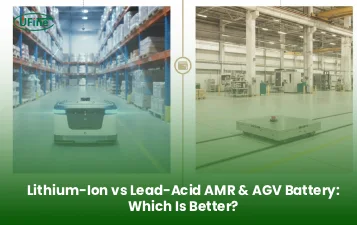
Lithium-Ion vs Lead-Acid AMR & AGV Batteries Compared
Discover the pros and cons of lithium-ion and lead-acid AMR & AGV batteries. Learn about cost, lifespan, safety, and which is right for your fleet.
2026-1-14 Ufine

Robot Vacuum Battery Replacement: Easy Step-by-Step Guide
Learn how to replace a robot vacuum battery safely and easily. Step-by-step instructions, battery types, costs, and common mistakes to avoid.
2026-1-14 Ufine

Discover how to choose the right battery for your robot. Compare Li-ion, LiFePO₄, NiMH, and more for performance, safety, and cost.
2026-1-14 Ufine

